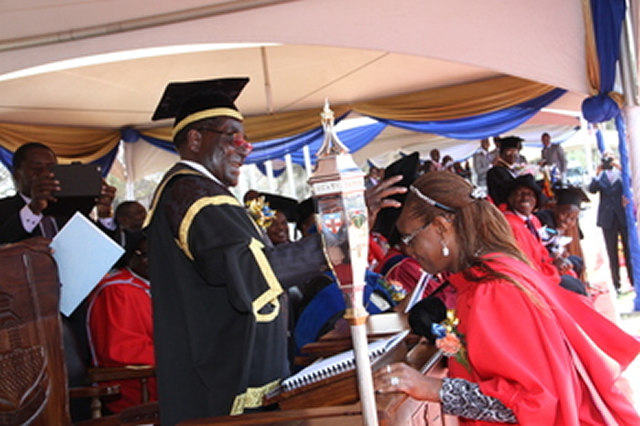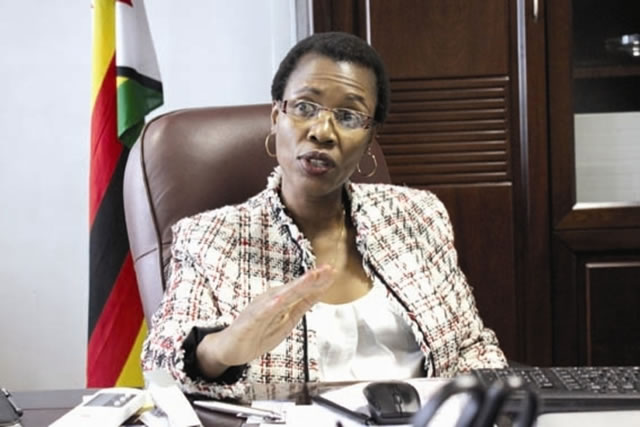City pay chews 50pc revenue

 Peter Matambanadzo and Zvamaida Murwira
Peter Matambanadzo and Zvamaida Murwira
Harare City Council blew half the $89 million collected from residents and businesses in the first half of the year on salaries and allowances at the expense of service delivery.This is in violation of a Government directive stipulating that 70 percent of revenue collected should finance service delivery, while the remainder should cater for salaries and allowances.
This also comes as Comptroller and Auditor-General Ms Mildred Chiri reported that the city lost $7 million in fraudulent activities committed by employees through the use of fake receipts, manipulating receipting machines, missing receipts and computer financial data.
The scandal involves cashiers, clearing officers and Information Technology employees.
In his presentation during the 2015 consultative budget meeting in Harare yesterday, acting finance director Mr Tendai Kwenda said half of the revenue was gobbled by salaries and allowances.
“We see salaries taking up 48 percent of the revenues. Service delivery 36 percent and nine percent for plant and equipment,” Mr Kwenda said.
He said the city was trying to maintain the salary bill to be in line with management best practices.
“Best practices have to be maintained, the (salary services) ratio should be 30 to 70 percent. On paper, I will admit that as we budget we strive to maintain that ratio, but when it comes to actual performance, it then becomes modern tragedy,” Mr Kwenda said.
He said despite the city writing off $330 million debt for residents and businesses, it was still owed more than $278,2 million.
Mr Kwenda said Government and parastatals owed the city $17,2 million, while dormitory towns of Chitungwiza, Norton Ruwa and Epworth also owed Harare city $4,1 million.
“As a consequence of this, our credit stands at $217 million,” he said.
Overspending by council has been the trend in most local authorities including Gweru, Mutare and Bulawayo.
Urban Council Association of Zimbabwe (UCAZ) acting secretary general, Mr Tserai Machinda, said although he could not divulge the salaries, the principle was that 70 percent was supposed to go towards service delivery and the remainder on salaries and allowances.
“That is the principle and that should be the practice. But this may differ from local authority to local authority since they have different budgets and revenue sources and even level of staffing,” he said.
Mr Machinda noted that it was, however, illegal for local authorities to use the bulk of ratepayer’s money on salaries.
“This 30/70 principle should be implemented by all local authorities,” he said.
Harare Residents Trust director, Mr Precious Shumba, said salaries of senior managers at Town House should be cut by 50 percent.
“The directors cannot continue to live lavishly while the majority of the employees are going for months without being paid. We hear that the Town Clerk still earns $32 000. As Harare Residents Trust, we will not allow you to loot public resources. From this meeting please go and seat and come up with a plan to cut your salaries by at least 50 percent to those people in grade one to four,’ he said.
In a related matter, the Auditor General Ms Chiri, revealed a scam involving misrepresentation of the number of receipt machines,
issuance of fake receipts and pocketing the money in a grand fraud, which auditors feel the prejudice could involve more money than the sample they took.
In her 2012 report for Harare city council, Ms Chiri noted that official reports indicated that the city had 800 receipting machines when only 134 existed, a situation that saw the receipting machines being connected onto the billing system without known physical connection presence, a scam that prejudiced the city of $7million.
“The reason for the virtual machines appeared to have been to create capacity for the perpetuation of fraud by the cashiers working in cahoots with some IT staff. An assessable amount of $7 200 000 was lost through the scams. Fraud may still be taking place,” read the report made available this week.
The audit showed that 1 386 receipts to the tune of $3, 2 million were fictitious.
On duplicate receipting machines, the audit observed that machines at different district offices were issuing receipts in the same number sequence and machines were used interchangeably to receipt revenue and cover up for fraud.
The audit also noted that clerks issued deposit slip that would appear on the city’s bank statements in duplicate or triplicate for the same periods but bearing different amounts of cash deposited into the bank accounts.
“Using forensic recovery tools, I reconstructed deleted data on the duplicated hard drives of the machines under review. A total of 6 402 deleted receipts were recovered from the selected machines,” read the report.
A total of 20 656 missing receipts were discovered from the selected machines.











Comments